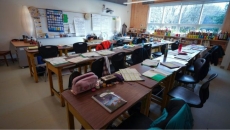The time, money and effort Iain Burns put into growing an audience on Facebook for several local news outlets in British Columbia felt like it disappeared in a single day.
Facebook pages for Now Media Group, which publishes news in B.C.'s Okanagan Valley, have since gone dark.
Last August, Meta removed news on its Facebook and Instagram platforms for Canadian users in response to the Liberal government's Online News Act.
As the managing editor with Now Media Group, Burns watched as his audience — and revenue — dropped because of it.
"We lost 70 per cent of our audience when that happened," along with 50 per cent of revenue, said Burns in an interview from Kelowna, B.C.
The company used Facebook to get clicks on its news stories, which in return brought in ad revenue for those views.
"We're not the only ones. Many, many outlets are in this situation."
A recent paper by the Media Ecosystem Observatory — a collaboration between McGill University and the University of Toronto — offers an initial glimpse into the effect of the Meta news ban.
National news outlets lost about 64 per cent of the engagement previously generated by users on their Facebook pages, the preliminary research shows.
Local news outlets lost about 85 per cent of their Facebook engagement, the study says, and almost half of all local news outlets stopped posting on Facebook entirely in the four months following the ban.
Some outlets "have gone dark entirely because they're no longer getting the ad revenue being driven from Facebook to their sites," said Aengus Bridgman, who directs the Media Ecosystem Observatory.
"And so this is hugely consequential for both Canadians and for news outlets."
Some outlets were able to maintain engagement on their Facebook pages because their news is still viewable outside Canada, and they have maintained an international audience.
While news outlets suffered, Meta itself was seemingly unaffected.
"One of the remarkable things we saw was the overall behaviour on the platform didn't decrease," said Bridgman.
"We didn't see Canadians saying, 'Oh, I no longer use Facebook, I no longer use Instagram.' It doesn't seem there's been sort of an exodus from the platform in any meaningful way."
The researchers found 33 per cent of Canadians still used Facebook or Instagram to get news about politics and current events several times a month, even though they couldn't see content from news outlets on either platform.
For the study, researchers collected Facebook data between June and December of 2023, tracking engagement before and after the ban.
They analyzed the Facebook pages of 987 Canadian news outlets, 183 politicians, commentators and advocacy groups, as well as 589 political and local community groups.
They saw a similar volume of posting within political discussion groups but instead of links to news articles, people posted screenshots of them, Bridgman said.
That means readers are seeing the content, but outlets aren't seeing the revenue.
"This study is pretty depressing, I think, from a public good perspective," he said.
The preliminary findings haven't yet been peer reviewed, but The Media Ecosystem Observatory plans to release a report in the summer.
Burns said some Facebook users have posted screenshots of his original content to their feeds or local community groups.
"The sad thing is politicians do it too," Burns said
He's also seen fake news stories masquerading as screenshots of national publications.
"Just from a reach point of view, it is very sad to spend hours and hours on a really good story, a proper good exclusive, and publish it, and then see it gets maybe 20 per cent of the reach it would have got before August 2023," Burns said.
The decision by Meta to remove news has created one of the largest disruptions to Canada's information ecosystem in recent years, the study says.
Meta resisted the measures in the Liberal government's Online News Act from the beginning, arguing that it was based on a "fundamentally flawed premise."
The law required Meta and Google to enter into negotiation with news publishers for licensing agreements to their content.
In response, Meta removed news links from its platform and Google was granted an exemption to the law by agreeing to pay Canadian news outlets $100 million a year.
Burns said he doesn't qualify for any of that money because his newsroom hasn't been designated as a qualified Canadian journalism organization under the Income Tax Act — a decision he said he's tried to have reversed.
It was denied that designation on grounds it doesn't produce original content, he said, despite reporting on local council meetings, provincial politics and, recently, a news conference by Prime Minister Justin Trudeau.
A reporter for one of his outlets posed a question to the prime minister about Meta that garnered national news coverage — something Burns said he found "ironic."
In response to the question about whether his government would compromise with Meta so that people in B.C. could access news links about wildfire season, Trudeau said the web giant is "irresponsible" and promised not to "bow down to them."
With a loss of revenue and no access to the Google money, Burns said his team is trying to shift more video coverage to grow its audience back.
Facebook "kind of showed who's boss, really, didn't they?" Burns said. "They showed they were the stronger party and I think that was a real lesson here."






